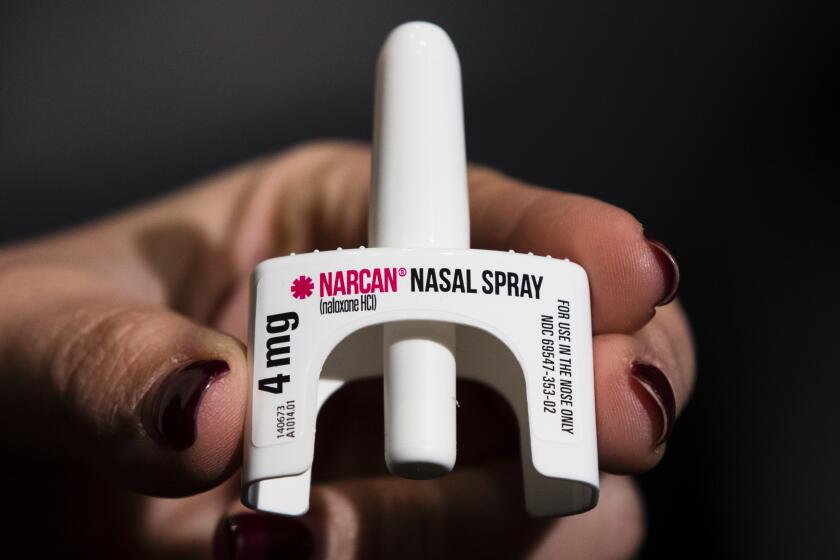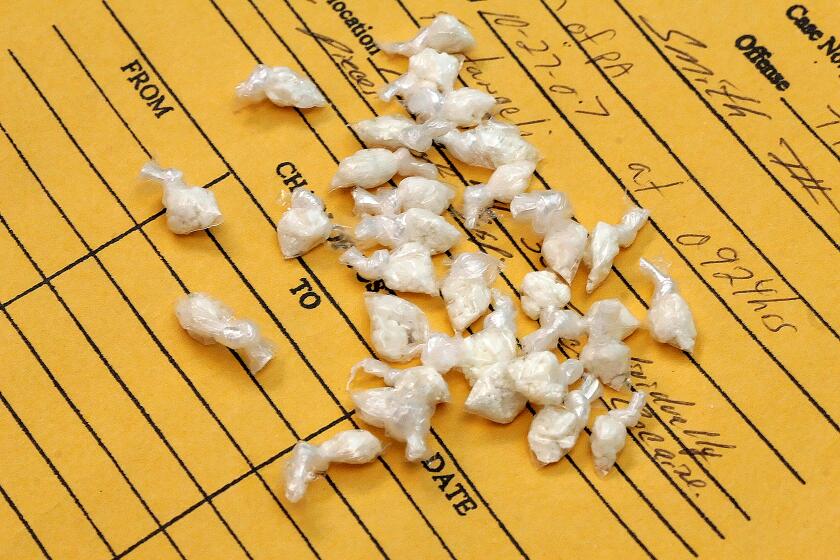Let’s not learn the wrong lessons from Matthew Perry’s ketamine tragedy

- Share via
It’s impossible to say with confidence that Matthew Perry would be alive today had he not gotten into his hot tub on Oct. 28 last year. But it’s hard not to wonder. The medical examiner’s report named “acute effects of ketamine” as the cause of Perry’s death, with contributing factors including coronary artery disease, an opioid known as buprenorphine — and drowning. The actor’s body was found face down in the water.
The report was released in December, but the question came up again last week after the arrests of five people criminally charged with supplying Perry with ketamine. Federal prosecutors charged two dealers, two doctors and Perry’s personal assistant with obtaining and administering thousands of dollars’ worth of ketamine.
Los Angeles has a serious meth problem that affects homelessness and crime. Policymakers and medical professionals must be more open about it.
The harm is not in ketamine itself, nor even in its rising popularity among the rich and famous. It’s in using it to prey on the ill and vulnerable for personal gain. Crackdowns on a drug are generally counterproductive. Crackdowns on unconscionable exploitation of vulnerable people for personal gain are generally in order.
Ketamine can have great therapeutic value when administered responsibly under controlled conditions, but it can be dangerous — as can any powerful medication or substance including alcohol, cannabis and opioids — when used carelessly or in the wrong setting. Too much of any of those substances can so affect the user’s judgment or consciousness that otherwise safe tasks such as driving or getting into a pool can turn deadly.
In the case of potent opioids such as fentanyl, an overdose can kill outright. That’s seldom the case with ketamine, but responsible doctors and therapists don’t leave patients unattended with access to dangerous quantities of the drug.
If the goal of fentanyl laws is to prevent overdose and poisoning deaths, they should fund testing, treatment and information. Harsher criminal punishment only will only make the next drug even more deadly.
Yet ketamine, legally approved in human and veterinary care as anesthesia and sedation, has long been popular as a club drug and is increasingly marketed through clinics to the wealthy to treat depression and other psychiatric ailments.
Our society continues to struggle with the proper regulatory and criminal justice approach to mind- and mood-altering substances. Our grandparents and great-grandparents briefly lived under Prohibition, when a ban on most alcohol made social drinking a crime, made mobsters and rum-runners rich and increased deadly violence.
Cannabis prohibition exacerbated racial discrimination in law enforcement and prosecution, and it corrupted the criminal justice system by allowing police departments to keep cash and other property allegedly involved in drug crimes. The opioid crisis turned pharmaceutical companies into pushers and physicians into dealers, and sapped the spirit of hundreds of cities ravaged by addiction and already struggling with a changing economy. Criminal justice reforms that seek solutions other than prosecution and prison too often lead police to simply not bother responding to drug-related antisocial behavior.
We’re taking a closer look at how ketamine is being used to treat depression, the path the drug took from general anesthetic to taboo rave drug to an off-label psychiatric medication, and the potential pitfalls.
We tend to reel between criminal prohibition and reckless mass marketing. Too often missing from the binary outlook are sufficient doses of public education and public health: education to warn of the dangers of various drugs without “Reefer Madness”-type hysteria and criminalization, and public health to provide care and treatment to those tragically ensnared by the addiction.
When used with guidance and care, ketamine is a remarkable if controversial medication, touted by some for its off-label use helping patients overcome debilitating emotional trauma.
Editorial: Reclassifying marijuana is not decriminalization, but is a welcome step in that direction
Taking cannabis out of the most-dangerous-drug category is almost literally the least the federal government can do on the subject. Further work is needed to catch up with Americans’ knowledge and practice.
It has also been used, shockingly, as a cruel law enforcement tool, as in the horrific case of 23-year-old Elijah McClain, who died in 2019 several days after two Aurora, Colo., paramedics injected him as he was being held down by police officers trying to take him into custody. He had not been accused of any crime.
There is no clearer sign that we are in over our heads in the drug war than this: Police keep arresting people for drug possession yet inject drugs into suspects to help them make arrests.
America responded to the 1980s crack epidemic with police and prisons instead of public health. Now look where we are.
Fortunately, ketamine injection has not caught on as a law enforcement technique, and the paramedics and officers were held to account for McClain’s death, losing their jobs and, in some cases, being prosecuted and convicted.
In Perry’s case, if the prosecutors’ allegations are correct, more wrongdoers may face justice. There will always be pushers, whether they are big pharmaceutical companies trying to increase sales of addictive painkillers, or high schoolers slinging fentanyl-tainted methamphetamine, or doctors trying to squeeze a few more dollars out of addicted patients. The key is to stop their cruelty without banning useful medications.
More to Read
A cure for the common opinion
Get thought-provoking perspectives with our weekly newsletter.
You may occasionally receive promotional content from the Los Angeles Times.














